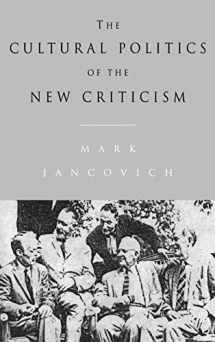
The Cultural Politics of the New Criticism
ISBN-13:
9780521416528
ISBN-10:
0521416523
Edition:
1st ed
Author:
Mark Jancovich
Publication date:
1993
Publisher:
Cambridge University Press
Format:
Hardcover
232 pages
FREE US shipping
Book details
ISBN-13:
9780521416528
ISBN-10:
0521416523
Edition:
1st ed
Author:
Mark Jancovich
Publication date:
1993
Publisher:
Cambridge University Press
Format:
Hardcover
232 pages
Summary
The Cultural Politics of the New Criticism (ISBN-13: 9780521416528 and ISBN-10: 0521416523), written by authors
Mark Jancovich, was published by Cambridge University Press in 1993.
With an overall rating of 3.5 stars, it's a notable title among other
books. You can easily purchase or rent The Cultural Politics of the New Criticism (Hardcover) from BooksRun,
along with many other new and used
books
and textbooks.
And, if you're looking to sell your copy, our current buyback offer is $0.3.
Description
In this book, Mark Jancovich concentrates on the works of three leading American writers - Robert Penn Warren, John Crowe Ransom and Allen Tate - in order to examine the development of the New Criticism during the late 1920s and early 1930s, and its establishment within the academy in the late 1930s and 1940s. This critical movement managed to transform the teaching and study of English through a series of essays published in journals such as the Southern Review and the Kenyon Review. Jancovich argues that the New Criticism was not an example of bourgeois individualism, as previously held, but that it sprang from a critique of modern capitalist society developed by pre-capitalist classes within the American South. In the process, he clarifies the distinctions between the aims of these three Southern poets from those of the next 'generation' of New Critics such as Cleanth Brooks, Warren and Welleck, and Wimsatt and Beardsley. He also claims that the failure on the part of most contemporary critics to identify the movement's ideological origins and aims has usually meant that these critics continue to operate within the very professional terms of reference established through the New Critical transformations of the academy.


We would LOVE it if you could help us and other readers by reviewing the book
Book review

Congratulations! We have received your book review.
{user}
{createdAt}
by {truncated_author}


